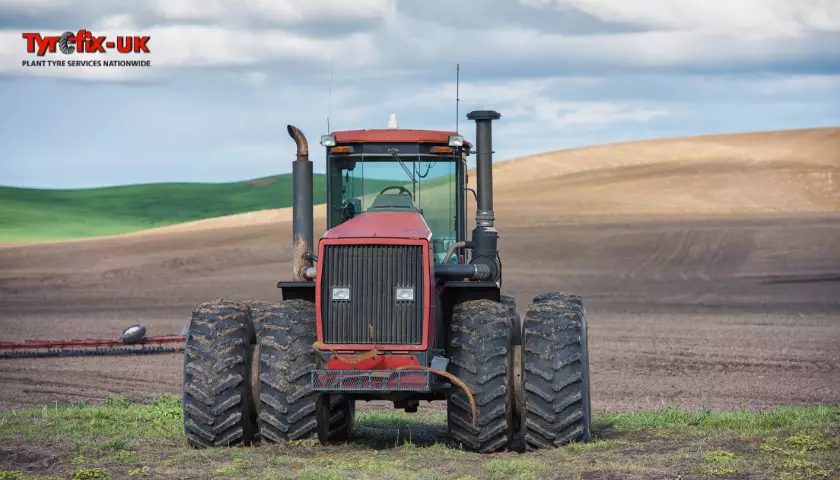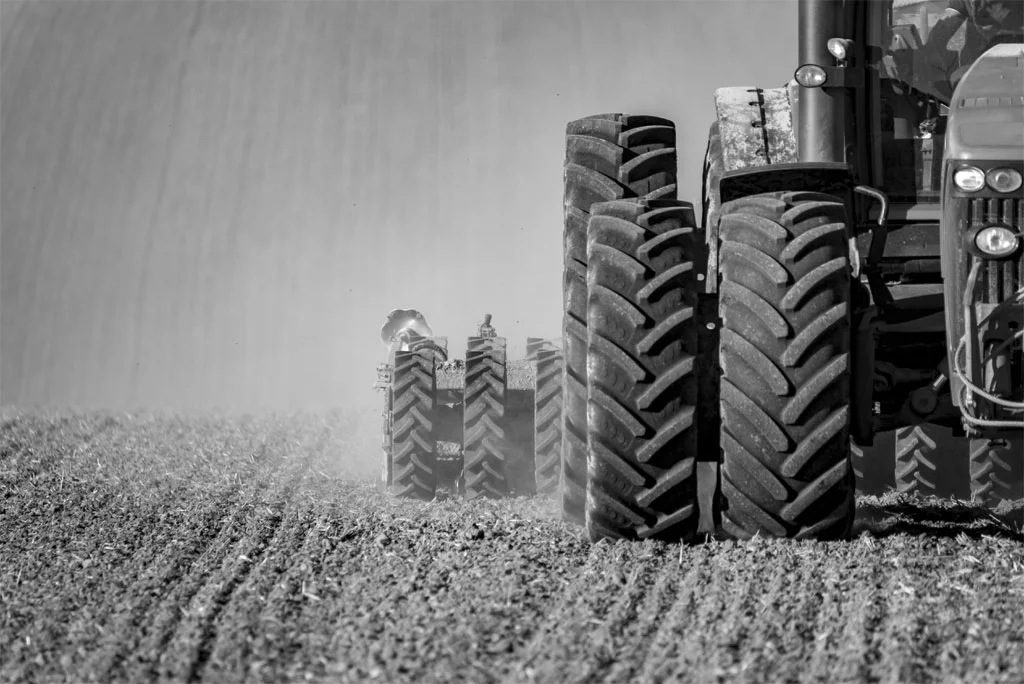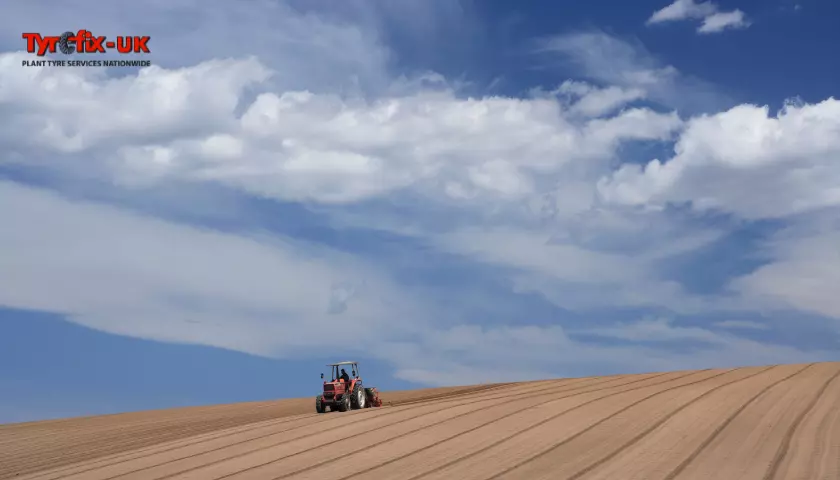Choosing The Right Farming Tyres For All Conditions
As any farmer will tell you, not all land is as easy to farm as flat agricultural plains. Often, farmers are faced with sloping land that they could use for production purposes but only when using the right farm equipment, machinery and farming tyres. Don’t forget about tyre pressure as it depends on the conditions and the job at hand which can make certain tasks a lot easier.
If you know how to adapt your agricultural machinery and which tyres are better suited to successfully farm on a steep incline, you will minimise the risk of your tractor overturning and excess wear to vehicle and equipment parts. The right farming tyres are essential in handling steep slopes whether for soil preparation or harvesting. Here is everything you need to know.
Choosing The Right Farming Tyres For Soil Preparation On Sloped Land
All farming tyres are designed to perform on most types of ground conditions including Michelin, Trelleborg, Continental, BKT and Alliance among others. An issue that may arise is having a tractor or farm machinery equipped for flat ground that cannot handle any type of slope.
Considering the complexity of tilling on sloping land, farmers must be fully prepared to stop the soil preparation process from turning into a catastrophe. A major concern is loss of adherence linked to load transfer to the tyres which are lower down.
When the tractor faces down the slope, the total weight of the trailer is transferred to the front axle while the front axle is completely weightless when the tractor goes uphill, which can lead to difficulty steering.
How To Prepare For Working On Sloping Land
When preparing soil on sloped land, you require greater precision in the equipment setup, choice of farming tyres, load calculation, precise adjustment of tyre pressure and the speed rating according to the corresponding load. It all starts with checking tyre pressure as the steeper the slope, the greater the load transfer to the downhill part of the machine.
If you haven’t factored in the right load or adapted inflation pressure sufficiently, the tyre could come off the rim. This usually happens when the load transfer is beyond the tyre’s accepted capacity. This may halt operations for some time as repairs on a sloping field is often more challenging.
When faced with rainy weather and waterlogged fields, farming tyres should have the lowest possible tyre pressure to avoid long-term damage to the soil.
Common Farming Tyres For Sloping Farm Land
Wider farming tyres are best to work on steep slopes as a tyre with a higher volume of air has a much bigger load capacity. Increasing tyre size enables farmers to follow the slope more safely and avoid unnecessary manoeuvring which can also help save time and money on fuel, for example.
When choosing farming tyres for sloping land, we recommend wider tyres with solid sidewalls to provide maximum stability. Bridgestone Series 70 or 65 VX-Tractor tyres offer all the benefits of a resistant casing structure associated with solid sidewalls.
These tyres are great for resisting the frequent deflections and the lateral load transfer linked to the position of farming equipment on sloping land. If you have several sloping fields, using dual agricultural tyres on the rear axle are ideal as your tractor becomes wider with a lower centre of gravity.
What About IF And VF Technology CFO Harvester Tyres?
Harvester tyres are specially designed for cyclic operations with a variable load since the hopper is filled and emptied regularly throughout the harvest. Thanks to advancements in tyre technology, the latest generation harvesting tyres allow for better load capacity while working faster than standard harvesting tyres at a tyre pressie of 2.4 bar.
IF And VF Technology farming tyres are ideal for working in challenging terrain as they are particularly adapted. Even if you cannot use the maximum bonus load due to the slope, these tyres are robust with a resistant design that guarantees quality work without compacting your soil. You can rest assured knowing these farming tyres are less likely to put your harvesting campaign on hold even if a small problem arises.
How To Reduce Soil Compaction
Compacting soil is referred to as soil damage caused by heavy agricultural machinery moving over land and often in adverse weather conditions. Soil compaction is linked to the nature of the soil from its water content and crop types to the load applied to the surface.
When agricultural equipment and heavy farming tyres repeatedly moves over the land, it creates soil compaction and shear. As a result, this reduces the capacity for aeration, infiltration, and crop root penetration.
The economic impact of soil compaction is rather high as it leads to reduced crop yield, a bigger risk of disease development, and regeneration work such as ploughing and/or de-compaction. All of these corrective functions can take up a considerable amount of time and fuel, including the formation of ruts.
Managing Rut Formation
Rut formation is a major issue on muddy ground and refers to longways indentations in the soil caused by farm machinery sinking into it as they pass over. It has dire consequences for crops as it encourages water stagnation that asphyxiates plants and promotes the development of disease. Considering nothing grows in a rut, it represents a net loss of yield.
Ruts also result in farm machines using more energy and that means increased fuel consumption. When a field is damaged by substantial rut formation, it has to be repaired and requires soil regeneration work. A tyre that is in direct contact with the ground can help limit soil compaction and rut formation.
How Farming Tyres Can Help Protect The Soil
Farming tyres can help with rut formation if it enables you to carry heavy loads at very low tyre pressure. For example, the pressure in the tyre is close to the average pressure applied to the soil – if the pressure in the tyre is 1 bar (14.5 psi), the pressure applied to the soil by the tyre will be around 1 lb/sq.in or 1 kg/cm2.
Remember, the higher the tyre pressure, the more pressure it applies to the soil which leads to a higher level of soil compaction and rut formation. It can get even worse when agricultural tyres slip so make sure you use the right farming tyres with effective traction. Among other tyre brands, Michelin develops farming tyres that help reduce soil compaction and improve traction.
Popular Farming Tyres To Minimise Soil Damage
Michelin’s UltraFlex technology improves crop yields due to an innovative and tough casing that allows for more flex. Michelin UltraFlex tyres can carry heavier loads even at very low tyre pressure no matter how fast you work. The flexible construction also allows for a larger footprint and that means better traction, helping you save time and fuel while protecting your soil.
Tyre width has a significant impact on soil compaction as wide and large volume tyres reduce pressure at the same load, provide a better level of traction, retain the same external diameter and rolling circumference as a “standard” tyre. The good news, if your tractor was originally fitted with standard tyres, you can fit wide or large volume tyres.
Farming Tyres For Sandy And Stony Land
Choosing the best farming tyres to facilitate certain operations suitable to the type of soil is essential. As with sloping fields, when farming on sandy, stony land, the choice of the tyre can make all the difference. When dealing with stony fields, the risk of getting punctures is even higher, not to mention the added pressure of managing sandy surface areas.
The solution is a wider tyre print and tread that can guarantee reduced soil compaction. Farming tyres with a robust design and ultra-resistant casing with specially reinforced beads are often the best choice. To meet the requirements of farming on sandy and stony land in the UK, consider BKT’s AGRIMAX V-FLECTO, AGRIMAX TERIS and FL 630 farming tyres.
- AGRIMAX V-FLECTO – dedicated to high-powered tractors to guarantees top performance on every type of soil
- AGRIMAX TERIS is designed for harvesters and reapers with a strong flotation capacity and is particularly resistant to cuts and impacts
- FL 630 is a flotation tyre characterised by optimal flotation capacity which reduces the impact on the ground

Contact TyreFix UK For Farming Tyre
With many years of industry experience, TyreFix UK has built tremendously strong business relationships with all major tyre manufacturers. We have a strong presence within the sector and while we mentioned some specific tyres in this post, we remain brand-agnostic. We never promote one brand over another and will only supply and fit the best farming tyres for your requirements.
If you need some advice about the best farming tyres for your particular job or soil type, contact us today on 01530 244 444. And, if you have any tyre-related problems and are unsure whether you need a Repair or Replacement, use our farming tyres mobile app to submit your photos and Tyrefix will be in touch a.s.a.p.







 Find a Tyre Fitter
Find a Tyre Fitter

Leave a Reply